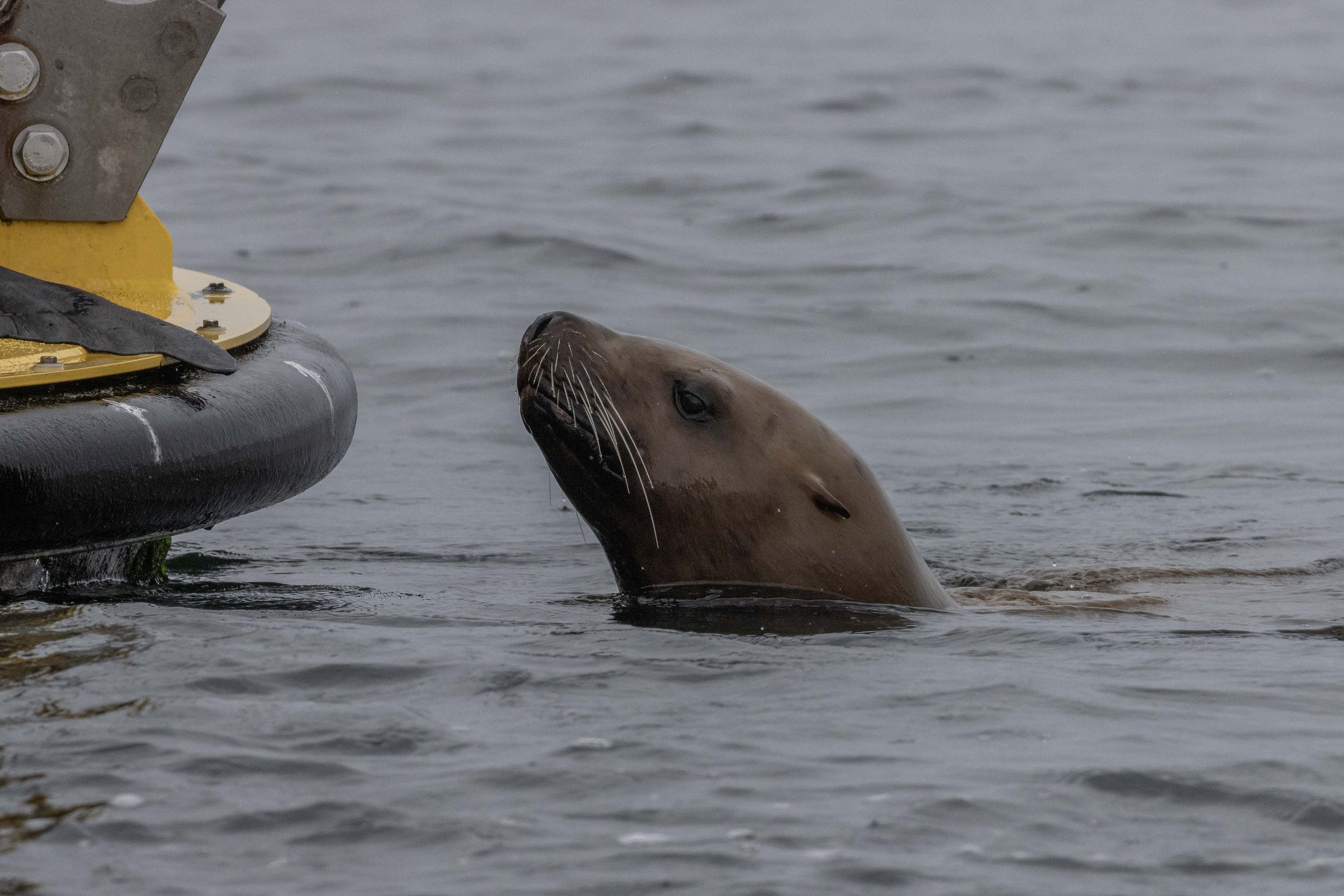June 29, 2024, 3:30 pm - The T099s as well as Dalmatian and Ocular
It was another moody afternoon as we had one of our open boats, Cascadia, heading out back onto the Salish Sea to search for whales. It was beautiful and calm, even though the sky was overcast, making the conditions perfect for spotting! We knew generally where we were headed today since one of the Vancouver-based boats had come across a pod of orca while we were just heading out of the Harbour. So, of course, we decided to go that way and see if we could catch up with them as well!
Along the way, we made a stop at the Halibut Bank ODAS buoy which has had a few seal lions hanging out on it recently. This buoy is collecting ocean data, including ocean temperature, wave heights, wind speeds, and more! It is a very important navigational feature for us since it gives us an idea of what it will be like to cross the Strait of Georgia on any given day. The Sea Lions like it for its positioning in the middle of the Strait as well, especially given it is right on top of a Bank, which is a high productivity zone with lots of food there for them. They are mostly after fish, with a large portion of their diet being the larger salmon and flat fish. They can spend time on the buoy and then jump in the water for the smorgasbord of food below. Other animals will also be using this highly productive area like the small Harbour Porpoises and Harbour Seals, which might be why the transient orca were nearby. They were headed south in the Strait, travelling in a tight formation, maybe resting as they went. It was a pod we had been seeing a lot in the past week, the T099s! There are 5 members:
T099 Bella ♀ (~1984)
T099B Holly ♀ (2007)
T099C Barakat ♂ (2009)
T099D Puck ♂ (2015)
T099E ♀ (2021)
This pod is great to look at, as nearly every member has something unique about their dorsal fin. Holly is the most obvious, with her deep notches towards the top of her fin. Barakat is the only sprouting male, meaning his dorsal fin is much larger than the other members. Puck is also male but is still young enough that his fin hasn’t started growing, it does have a small notch at the top which is easy to spot! Bella and her youngest, T099E, are both without notches, but for now their size difference is enough to tell them apart.
After spending some time with the T099s and watching them travel, it was time to leave them behind and see what else might be waiting for us along our journey home. We continued south and came across a group of humpback whales that were feeding in the same area. We were able to get photos of two of the whales that we were able to ID, but the others in the distance remained a mystery. Dalmatian (BCY0994) and Ocular (BCX1705) were the two that we kept having closer to us, but it seemed that all of the whales were feeding in the area, with longer dive times, and sporadic surfaces. This makes sense, given that feeding is the main purpose of them returning to our waters. They are trying to build up those fat reserves that they survive off of when they migrate in the winter.
Eventually, it was also time to leave these whales to it, and time for us to return to the harbour! It was great to see all of the different wildlife spending time in the Salish Sea today. All the photos from this afternoon’s tour were taken by Marine Naturalist Vanessa Vereschahen.
Steller Sea Lions hauled out on the Halibut Bank ODAS buoy.
One of the Steller Sea Lions in the water beside the buoy.
These two were curious and checking us out from the water.
T099C Barakat surfacing in the rain.
T099B Holly has these very distinct notches in her dorsal that make her easy to recognize.
T099C Barakat surfacing with the tip of another’s dorsal fin beside him.
The youngest of the T099s: T099E!
T099C Barakat surfacing with younger brother T099D Puck just ahead of him.
T099D Puck has a small notch at the very tip of his dorsal fin.
T099C Barakat dipping under the surface of the water.
T099C Barakat is a sprouting boy, meaning his dorsal fin is developing into the large, straight dorsal fin of the adult male!
T099E surfacing beside mom, T099 Bella.
Family photo (minus mom): T099D Puck, T099E, T099B Holly, and T099C Barakat.
T099D Puck, T099C Barakat, and T099 Bella all surfacing together.
T099E, T099 Bella, and T099B Holly surfacing at the same time.
Dalmatian going for a dive.
The underside of Dalmatians Tail Flukes.
Ocular lifting his tail to dive.


















